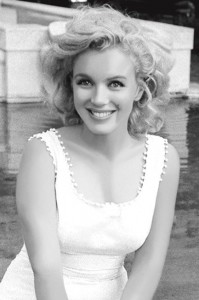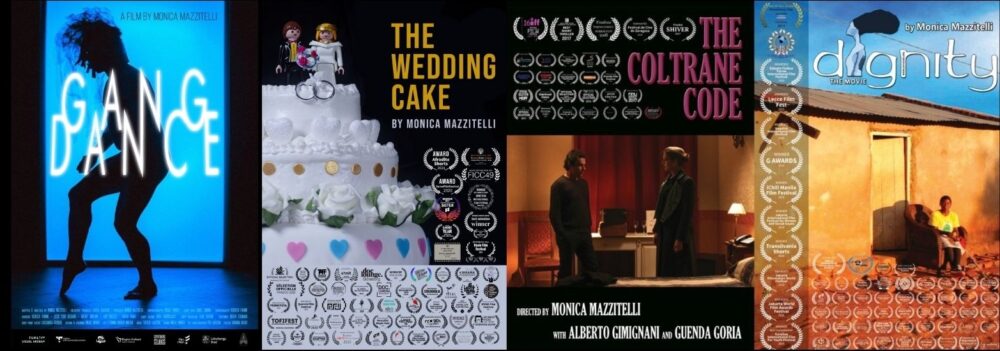 [For Marilyn Monroe’s non-90th birthday I decided to post this unpublished monologue, that I wrote with lots of love for a woman that is very very special to me. My clumsy translation into English was thoroughly revised by Ellen McRae]
[For Marilyn Monroe’s non-90th birthday I decided to post this unpublished monologue, that I wrote with lots of love for a woman that is very very special to me. My clumsy translation into English was thoroughly revised by Ellen McRae]
Me as a child and my mother screaming while laughing. Or laughing while screaming. I don’t know. Angry or happy. I don’t know.
My mother was crazy, I think. Ended up in the loony bin. I did, too, for that matter—a couple of times—maybe three. Once I asked Joe to come and save me. We ran away through the basement…
Joe DiMaggio, my crazy husband who I think loved me more than anyone. Why choose a woman that every American wants to take to bed if you’re jealous whenever anybody even looks at her? It’s like buying a cake when you’re diabetic. But he did love me—in his own crazy and twisted way, trying to suffocate me. With his love.
“You’re mine. You belong to DiMaggio. Capish? Understand?” and then he would make that gesture with his hand like he was going to slap my face. But I was hardly ever unfaithful to Joe—only if he was far away and I was really lonely. Him and his roses on my grave, for twenty years, at every birthday, I think. While my body, America’s most coveted body, was rotting in the coffin. My breasts cut off for the autopsy. They had to fill my bra so my Emilio Pucci dress would fit properly—emerald, beautiful. My face made up, my hair done, the screws tightened, the darkness over my body, the silence. My truest moment. My solitude.
If I hadn’t been killed, I would have ended up a different person. If I hadn’t been murdered I would have stopped being an actress—dying every morning before going on set. The fear, the panic about having to perform, to remember my lines. The lights up and everybody hating you, everybody, because you’re three hours late, again, day after day, and then you can’t remember the fucking line. That scene in Some Like It Hot where I had to just go in and say “Where’s my ukulele?” and not being able to say it—not remembering it—three stupid words that slipped from my memory, eaten up by panic. Pills for sleeping and pills to stay awake, pills to stop the panic, pills to stop the depression. And painkillers for period pain. The tension—the pressure. My intelligence devoured—throbbing and pushing from within, and telling me that everything I do is wrong—that everything I do is not me.
Desired by all, loved by few, understood by fewer still. Psychiatrists and psychoanalysts had piles of material on me: experiences, traumas, fears. Too much stuff—it would take a hundred years to gather it all together into a box. Organizing all the tiny crumpled sheets of paper that I’d tried to throw away every day, picking them out of the wastebasket, one by one, unfolding them and trying to iron them with the back of the hand. Turning it into a compact, tidy package, and handing it to me with a smile, saying, here, Norma Jean, this is your life. See what can you do with it now.
I had to unlearn everything. Stop using myself. Joe had understood this.
My body so full of female hormones that it got sick with endometriosis. A fucking disease you get when you’re too luscious and fertile—when your breasts explode and your uterus screams, “Babies! Babies!” Except your uterus is crazy and self-destructs, so you can’t get pregnant. You risk dying. And your body ends up killing your baby to save you. Your little girl or your little boy—you don’t know what sex it is. Maybe it’s neither because it’s an angel. And you could die, so you need to get an abortion. You go there and they suck everything out of you—except for the scream “Babies! Babies!”
When you go home you’re like a rubber doll, empty inside. Nobody sees it. They only see your soft shape and your breasts made for sucking, nothing else. You’re not a mother—you can’t become one. I’m not a mother, I couldn’t become one. Even though each period was as painful as labor, I never gave birth. I raised my chin and unclenched my teeth in a three-quarters smile, because I had to reassure everyone that I was fine, I was me—healthy, the blond wife of America—hairline raised by electrolysis, nose and chin touched up, perfect.
I looked at myself in the photos. I wondered if I really was pretty. Yes, I was. I was beautiful. I knew how to use myself, but the feeling of emptiness and pretense gnawed at my stomach. I knew who I was, but I was the only one who did. It was hard to show that I was smart. People raised their eyebrows just realizing that I wasn’t an idiot—like that was itself a miracle. No, I wasn’t very cultured, no, even though I tried to fix that. But I was smart and I knew two things above all. I knew how to give sexual pleasure, to men and women, no matter how little I took for myself, and I knew how to make people feel happy. I placed myself in front of them and, like a mirror made of sunbeams, gave them back their best self-image. I was like a drug for them, for a while. But then people got fed up. They don’t want to know about wasted potential. They want to wallow in their shit lives. They don’t want you to make them feel that they could be better than they are. Too much effort to move beyond themselves.
I also had a lot of ideas about politics that no one was interested in hearing about. Instead of talking about Cuba I spoke about human solidarity—the most that the American nation could emotionally tolerate. I barely escaped McCarthyism, so I learned to express my ideas only with true friends.
But the president’s speeches thrilled me. That’s what started things between us. His was a sick family. Dangerous. I would have survived if I’d been a stupid woman. I would have floated along in a dumb and comforting vacuity, with my endometrial womb and myopic gaze. I would have been America’s sweetheart until the next one showed up. But she didn’t.
No, there was no one else like Marilyn Monroe. I don’t say this with arrogance, or pride. There was no one else because it’s hard to find so much sex and so much death in the same flesh.
Only in the candor of my uterus, the cry, “Babies Babies!!” but, first, “Mommy! Mommy!” Mommy, the Madwoman.
